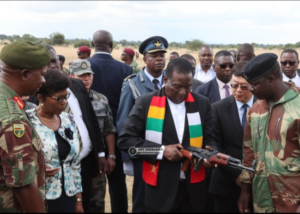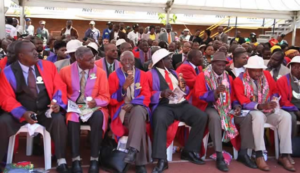PRESIDENT MNANGAGWA’S AUTHORITATIVE STRIDES
In a strategic and potent move, President Emmerson Mnangagwa of Zimbabwe has taken significant steps in consolidating power within his presidential office. This bold action has resulted in 13 key laws falling directly under his purview, significantly expanding his influence across essential aspects of governance. Notably, this includes control over the Anti-Corruption Commission, the Sovereign Wealth Fund, and the domain of electronic surveillance. Moreover, President Mnangagwa now holds the unprecedented authority to set his own Presidential Salary and Pension, a decision that many perceive as a clear step towards more centralized rule.
This political reconfiguration offers various interpretations. On one side, it represents a decisive effort to reinforce control over crucial state mechanisms, potentially leading to more efficient governance. However, on the flip side, critics view these developments as a worrying shift towards authoritarianism, with the concentration of power likely to hinder democratic engagement and accountability.
The control over the Anti-Corruption Commission is particularly noteworthy. This institution, vital in ensuring government transparency and accountability, is now under the President’s direct influence. Such a move positions President Mnangagwa as the primary overseer of integrity within the government, a role fraught with implications for checks and balances in governance.
Additionally, bringing the Sovereign Wealth Fund under presidential jurisdiction is a significant step. This fund, crucial for managing and investing national reserves to stabilize the economy, is now subject to the President’s direct oversight. While this could lead to a unified approach in economic management, skeptics fear it might become a tool for controlling national wealth.
The aspect of electronic surveillance, in an age where digital communication is central, is another area of concern. Control over surveillance mechanisms grants substantial power over information flow and public discourse, raising questions about privacy and freedom of expression.
Furthermore, the ability to determine his own Presidential Salary and Pension is more than a mere administrative detail. It symbolizes the depth of power consolidation and raises concerns about self-interest versus national interest in fiscal matters.
This extensive accumulation of power by President Mnangagwa mirrors a global trend of increasing centralization in political leadership. While it promises streamlined and cohesive governance, it simultaneously poses critical questions about the balance of power and democratic accountability.
As Zimbabwe witnesses these decisive moves towards a more centralized governance model, the impact on the nation’s democratic structure is yet to be fully understood. This situation in Zimbabwe serves as a significant example of the intricate balance between centralization of power and the preservation of democratic principles. As President Mnangagwa advances his agenda, the implications for Zimbabwe’s democratic fabric and its future remain a subject of intense debate and observation.



